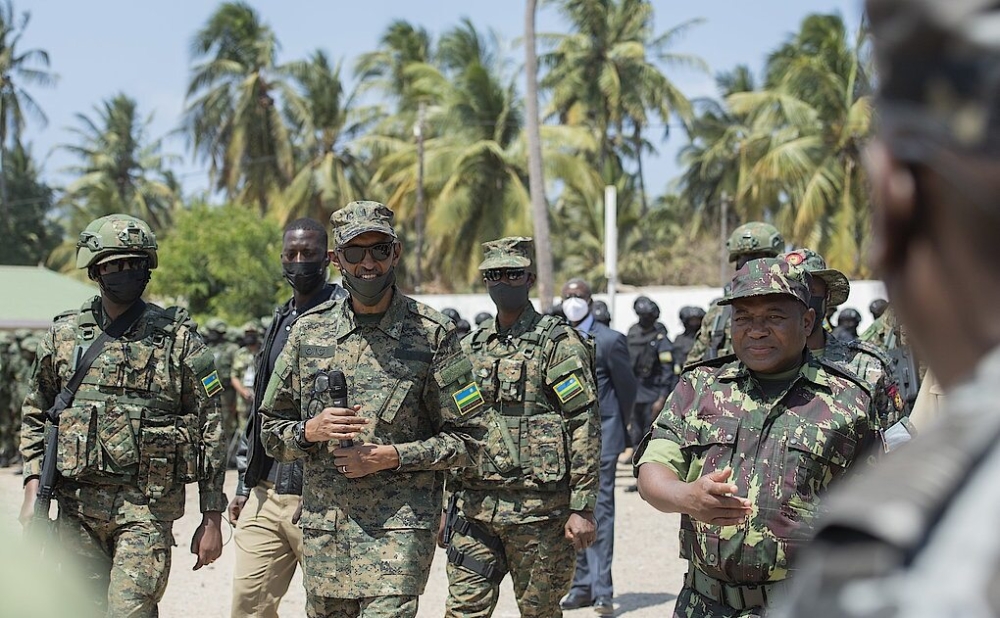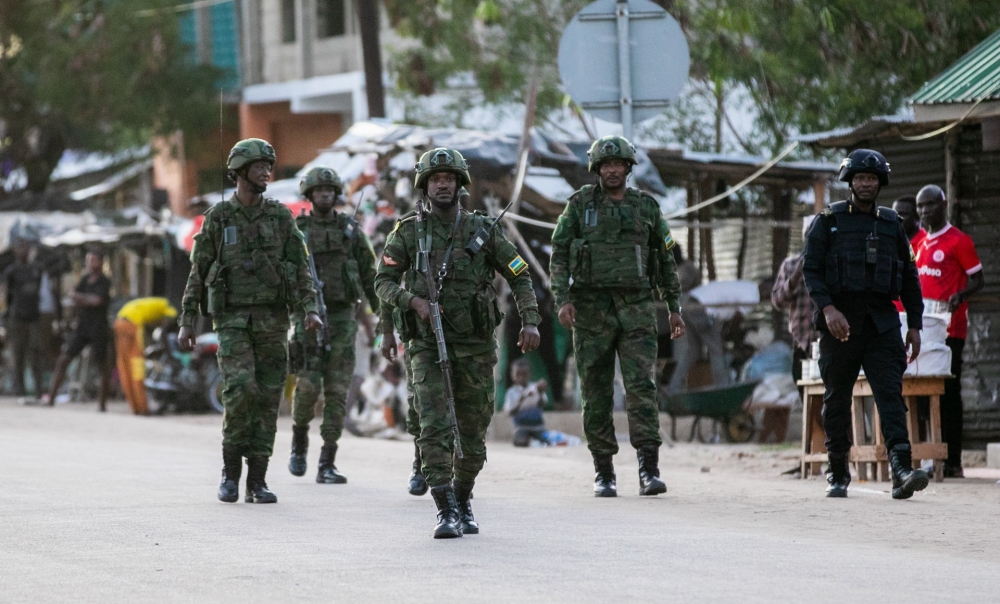

The Southern African Development Community Mission in Mozambique (SAMIM) has come and gone. The Rwandans remain. The Tanzanians also remain. All of them, alongside Mozambique's defence and security forces, are committed to eliminating terrorism in the country.
The intention of the Rwandans, upon their arrival in July 2021, was clear: their stay was not contingent on time but on accomplishing the mission. In other words, they came to Mozambique to effectively combat terrorists especially through joint operations with their Mozambican counterparts and training. Rwanda’s intention is capacity building, looking at the long run and sustainability of the effort.
ALSO READ: AU chief says Rwanda&039;s troop deployment to Mozambique a concrete act of African solidarity
Tanzania thought the same. Due to logistical constraints, SAMIM came to Mozambique but had to return after two years. However, we can learn from SAMIM's multilateral cooperation model, which has shown significant potential in combating terrorism, and we have also learned significantly from the bilateral articulation with Tanzania and Rwanda.


ALSO READ: Demystifying the deceptive narrative about Rwanda&039;s role in conflicts in DR Congo and Mozambique
I have analysed the set of arguments that some intellectuals opposed to the presence of Rwandan forces in Mozambique use, and I have grouped them into three categories:
Firstly, arguments from ignorance: This group includes people who, without understanding the specific context of Mozambique-Rwanda relations in defence and security, whose protocol was signed during former President Joaquim Chissano's time, repeat narratives that reflect Rwanda's disputes in its international relations.
These include the conflict in DR Congo, consequences of the 1994 genocide against the Tutsi in Rwanda, and 'freedom and democracy in Rwanda.'
Mozambique's response to these arguments has been systematic and unwavering. Mozambique does not buy into foreign wars and conducts its foreign relations with the national interest at heart. Mozambique does not involve itself in other countries’ problems, although it advocates for the negotiated resolution of all conflicts. Therefore, despite being loud, the repetition of these arguments is neither severe nor plausible.
Secondly, misinterpreted geopolitical arguments: This group includes people who adopt foreign narratives to apply them to Mozambique. There is unease between Rwanda and DR Congo, which I extensively explained in a March publication.
There is also an opposition movement to Rwandan President Paul Kagame, accusing him of pursuing opponents wherever they are. There are still tensions in relations between South Africa and Rwanda through DR Congo.
Recall that during Dr. Tomaz Salomão's tenure as SADC Executive Secretary (2005–2013), Rwanda attempted to submit its candidacy for SADC membership. The process progressed until moments before the Summit meeting for deliberation, which was favourable. Realising this, DR Congo, which was in arrears and therefore without voting rights, settled the debt only to veto Rwanda's entry.
This happened in 2005, during Dr. Tomaz Salomão's first term. Two years later, in 2007, Kagame announced he would never again seek integration into SADC.
In May 2023, it was already known that SAMIM would leave Mozambique, judging by successive short-term extensions. By August of the same year, the last extension was known.
ALSO READ: SADC summit endorses military deployment in DR Congo
Three months earlier, on May 8, in Windhoek, Namibia, SADC established SAMIDRC – SADC Mission to DR Congo – and South Africa said it would contribute 2,900 soldiers. Therefore, if the reason for leaving Mozambique was logistical, there was money to deploy to DR Congo? The same SADC! SAMIDRC's mission is to combat the M23 rebels and the southern African bloc’s new mission comprises troops from South Africa, Malawi, and Tanzania, the latter also present in Mozambique.
ALSO READ: South Africa sends 2,900 troops to DR Congo
Perhaps it would be useful to summarise that Rwanda's entry into Mozambique displeased DR Congo due to its dispute with Rwanda. But who was pleased by SAMIM's departure from Mozambique? Not Mozambique. Surely it pleased DR Congo. Kinshasa took revenge, for the second time, in the international forum. For historical context, SAMIDRC replaced the East African Community Regional Force (EACRF), which, weeks before withdrawing, was accused by the Kinshasa regime of reluctance to take offensive measures against the M23 rebels.
Who are the M23 rebels?
The M23 rebellion is a Congolese political-military movement that has existed since mid-2012. Many of its members are Congolese who have Rwandese heritage – such as the military commander Maj Gen Sultani Makenga who is a Congolese Tutsi. But the group is so diverse, with members from other regions of the country. Lawrence Kanyuka, the M23 spokesperson, is from the Luba ethnic group, just like Congolese President Félix Tshisekedi.
The M23 rebels resumed fighting in early 2022, after a 10-year hiatus. They are fighting to protect civilians in DR Congo who are persecuted by negative armed groups such as FDLR, a UN-sanctioned militia that is spreading genocide ideology, hate speech and violence, especially targeting Congolese Tutsi communities in the east of the country.
In May 2012, the rebellion re-emerged because Kinshasa failed to implement peace agreements signed on March 23, 2009, hence the name Mouvement du 23 mars (or, the March 23Movement), often abbreviated as M23. Lately, the rebel group is part of a larger political-military alliance, Alliance Fleuve Congo, formed in Nairobi, Kenya, in December 2023. It is led by Corneille Nangaa, the former chairman of the DR Congo electoral commission. The rebels are, by and large, especially fighting for good governance in their country. They seek to guarantee the protection of the rights of all citizens, address the root causes of conflict and insecurity, and uproot genocide ideology.
What triggered the latest revolt?
In 2012 and 2013, M23 seized large parts of eastern DR Congo and entered the provincial capital and strategic economic hub, Goma, before being driven out by Congolese and UN forces and fleeing to Uganda and Rwanda. Even then, however, dialogue between the rebels and the Congolese government continued, in Nairobi and Addis Ababa, reaching a demobilisation and reintegration agreement.
The rebels then waited for the implementation of the declaration signed on December 12, 2013, in Nairobi, but – for 10 years – nothing happened.
When Tshisekedi took over from Joseph Kabila, in January 2019, he invited the rebels’ representatives to Kinshasa, for talks. After spending 14 months in Kinshasa, without any fruitful talks with Tshisekedi’s government, the rebels were discouraged. Things worsened when Congolese forces started attacking the rebels’ positions in the east, in November 2021. When the attacks continued, the rebels retaliated. By March 2022, the conflict flared up. The rebels launched a series of attacks and seized large swathes of territory in eastern DR Congo, as a defensive response to the Congolese army attacks. Despite Kinshasa’s continued denial, the Congolese army was collaborating with the genocidal militia from Rwanda, FDLR, in attacking M23 positions.
ALSO READ: UN report exposes DR Congo’s continued use of FDLR as proxy
Thirdly, arguments from fear and jealousy: The arrival of friendly forces reinforced Mozambique's combat capability against terrorism. In a similar period, in North Africa, terrorists advanced and almost took the capitals of Mali, Niger, and Burkina Faso.
The difficulty of the "aid" they received from other countries, primarily European, led to coups and countercoups and placed military governments in power. The model adopted by Mozambique is probably the most successful, judging by how the terrorists' advance was contained seven years later.
This is likely what incites jealousy among some compatriots, manipulated by international propaganda that distorts the truth and pits us against each other, distracting us from the essential mission to defeat terrorism in Mozambique. They wanted a Mozambique prostrated to terrorists, from Rovuma to Maputo, a scenario that for them would be a "childhood dream," seeing President Filipe Nyusi leave power with a wholly disintegrated Mozambique.
I conclude with a rallying cry from former President Samora Machel's era: "Let us impermeabilise ourselves against the manoeuvres of imperialism." In this specific case, against the anti-patriots.
The author is a Mozambican historian | egidiovaz.com


